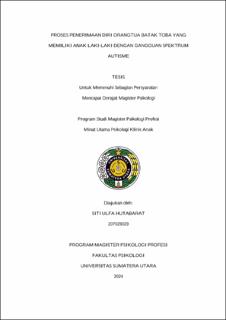| dc.description.abstract | This study aims to understand the self-acceptance process of Batak Toba parents who have a son with autism spectrum disorder. The research method is qualitative, using a phenomenological approach. Data collection was conducted through in-depth interviews with three Batak Toba married couples. The results show that two couples have reached acceptance, while one couple remains in the depression stage. Each couple goes through the stages in different sequences; however, the wives experience a more complex process and have higher stress levels. This is because wives spend more time caring for the child and are more vulnerable to negative stigma from their social environment. Protective factors that support the couples' self-acceptance include spousal and family support, self-understanding, realistic expectations, and religiosity. Conversely, the couple that has not yet reached acceptance faces greater risk factors due to a lack of social support, especially from family, as the husband's parents have passed away. They also have only one son diagnosed with autism, leading to increased pressure as cultural expectations for a son's role weigh entirely on him, making it harder for the couple to adjust. Batak Toba values serve as both protective and risk factors. The values of hagabeon and hasangapon add pressure due to the child’s limitations in fulfilling cultural demands, while the value of hamoraon acts as a reinforcement by encouraging parents to view the child as a valuable asset, motivating them to continue loving and supporting their child’s development, even at great financial cost. | en_US |


